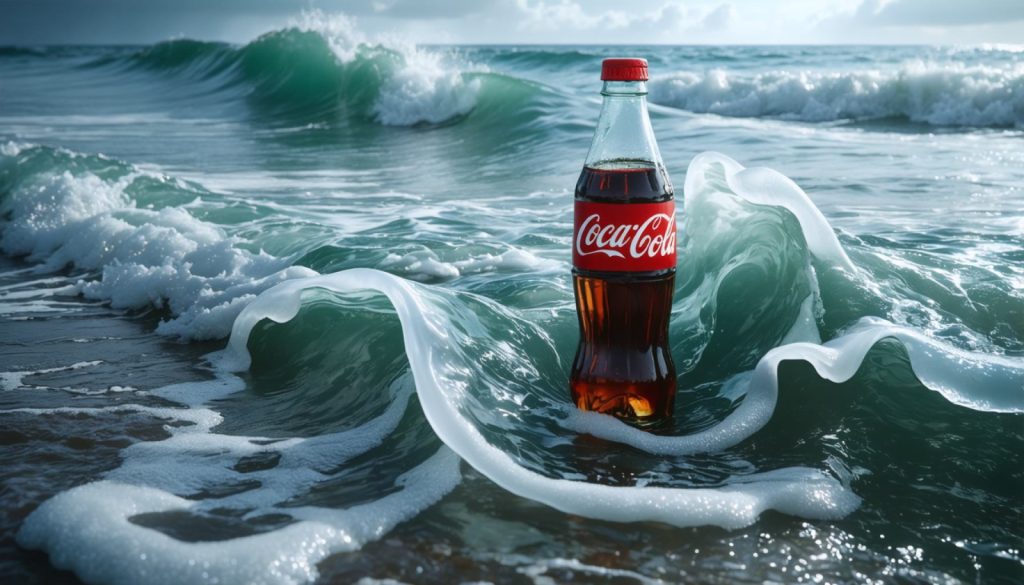
- By 2030, Coca-Cola’s plastic usage could reach 9.1 billion pounds annually, posing a major environmental threat.
- Current recycling efforts are insufficient, as even bottles made from recycled plastic contribute to ocean pollution.
- Plastic degradation releases harmful chemicals linked to health issues, impacting both marine life and human health.
- Advocacy groups, like Oceana, advocate for reusable packaging as a sustainable alternative to single-use bottles.
- While Coca-Cola has the opportunity to lead in sustainability, their hesitation on reusable packaging goals is concerning.
- The company’s choices carry ethical and environmental implications, influencing both corporate responsibility and consumer behavior.
- Consumers can drive change by choosing reusable products and supporting environmentally responsible brands.
- Coca-Cola’s potential leadership in sustainability could inspire industry-wide transformation.
A sweeping tide of plastic is rising, and it’s threatening to cast a shadow over Coca-Cola’s legendary brand status. If the numbers are to be believed, by 2030, the company could be drowning the planet under 9.1 billion pounds of plastic annually. Picture the earth cloaked in a dizzying sea of discarded bottles that, when lined up, could circle the globe over 100 times. This is more than aesthetic pollution—it’s an unfolding environmental crisis.
The irony pulses sharply: Coca-Cola, beloved worldwide for its refreshing beverages, is now faced with an unpalatable dilemma. While recycling efforts are heralded as the frontline warriors against plastic waste, their efforts often fall short. Bottles designed from recycled plastic still find their way to marine environments, contributing to the very oceanic pollution they aim to mitigate. This cycle raises complex questions about our reliance on recycling as a silver bullet for plastic waste.
Yet, this is irreparably tangled with human health concerns. As plastics degrade, they leach harmful chemicals with dread-inducing links to cancer, heart disease, and developmental disorders such as autism. Every plastic bottle left adrift in the ocean is more than just trash; it’s a potential carrier of doom for marine and human life alike.
Advocacy groups, spearheaded by organizations like Oceana, shine a spotlight on a critical solution—reusable packaging. A simple pivot toward glass or durable containers could revolutionize the landscape, replacing millions of single-use bottles. Yet, despite the roadmap being clear, Coca-Cola’s retreat from ambitious reusable packaging goals signifies hesitation at a vital juncture.
Oceana champions marine conservation, echoing the urgent need for brands to embrace sustainability and protect ecosystems. They remind us that a flourishing marine environment is within reach, provided that substantial steps are taken.
The crux of Coca-Cola’s decision lies in a fundamental choice: perpetuate plastic’s relentless expansion or steer toward innovative, responsible practices. As they chart this course, the implications extend beyond environmental concerns. It raises ethical questions about the role of influential corporations in safeguarding both planetary and human health.
Ultimately, the narrative of Coca-Cola reflects a broader global struggle with plastic waste. Consumers hold the power to influence change by opting for reusable products and supporting brands committed to ecological responsibility. For Coca-Cola, leading by example could transform not just their own legacy, but could potentially set a sweeping precedent across the industry.
In a world aching for sustainable solutions, it’s time for Coca-Cola to embrace its potential as a beacon of change. The future of their brand—and indeed, our oceans—hinges on this pivotal decision.
Coca-Cola’s Plastic Problem: Can They Be the Change the World Needs?
Understanding the Plastic Predicament
Coca-Cola’s branding and refreshing beverages are recognized globally, yet, in what could be seen as a looming breach of trust, their plastic waste footprint threatens to outstrip their iconic status. By 2030, they are projected to generate 9.1 billion pounds of plastic per year, a staggering volume that underscores the critical environmental crisis we face.
Recycling: Not a Silver Bullet
Recycling has long been portrayed as the go-to solution for plastic waste. However, the reality is that recycled bottles often end up in marine environments, exacerbating pollution. According to National Geographic, only about 9% of all plastic ever produced has been recycled [source: National Geographic].
Questions Readers May Have:
1. Why can’t recycled plastic solve the problem?
– Recycled plastics frequently suffer from contamination issues and often require energy-intensive processes to be repurposed, making it not as sustainable as presumed.
2. What are the health risks associated with plastic degradation?
– Degrading plastics leach chemicals such as BPA, associated with health issues like cancer and developmental disorders.
The Reusable Revolution
Organizations like Oceana advocate for a shift towards reusable containers, such as glass or durable materials. Coca-Cola has already experimented with glass bottles but seems hesitant to fully embrace this path. With their vast resources, Coca-Cola is uniquely positioned to set a new standard in sustainability.
How-To Steps for Consumers:
– Opt for Reusable Bottles: Choose beverages in glass containers or carry your own reusable bottles.
– Support Eco-Friendly Brands: Encourage brands that prioritize sustainability by choosing their products.
– Advocate for Change: Engage with campaigns and initiatives that push for increased use of reusable packaging.
Industry Trends and Insights
The beverage industry is gradually shifting towards sustainability. Market analysis from Statista indicates that consumer demand for eco-friendly products is rising, with expectations that recyclable and renewable packaging will dominate by 2050.
Market Forecast:
– The global market for biodegradable plastics is expected to grow to 6.12 billion USD by 2026, according to Grand View Research.
The Ethical Imperative
Coca-Cola must decide whether to continue a path of plastic proliferation or to innovate responsibly. Their actions have reverberating consequences, posing ethical considerations regarding their obligation to protect our planet.
Pros and Cons Overview:
Pros of Reusable Packaging:
– Reduces environmental impact significantly.
– Decreases dependency on fossil fuels used in plastic production.
– Enhances brand image and consumer loyalty.
Cons:
– Higher initial costs for production and logistics.
– Requires consumer behavior change and adaptation.
Actionable Recommendations
1. Scale Up Reusables: Coca-Cola should invest in infrastructure that supports reusable packaging at a larger scale.
2. Enhance Recycling Efforts: Improve recycling systems to efficiently process and reduce plastic waste.
3. Consumer Education: Launch campaigns to educate consumers on the benefits of choosing sustainable packaging.
In conclusion, while Coca-Cola’s plastic waste issue is a microcosm of a broader environmental challenge, it presents an opportunity for innovation and leadership in sustainability. As consumers, our choices can compel Coca-Cola and others to pave the way toward a greener future.



